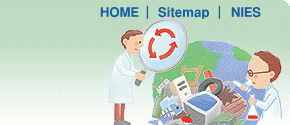


HOME > About the center > Priority Program: Sustainable Material Cycles
"Priority Program: Sustainable Material Cycles" comprises the following. In addition to these, there are associated research projects promoted chiefly by other research units within the NIES.
1. Core research projects
Four projects are undertaken to achieve the core research objectives of the priority research program. Through these projects, we will develop material cycle technology systems to underpin a science- and technology-supported nation and propose policy options to further 3Rs (waste reduction, reuse and recycling) promotion in line with international society so that we may ensure that the cyclical use of resources and the treatment and disposal of waste are subjected to appropriate management. In this way, we will show an exemplary embodiment of a sound materialcycle society required in the near future, and push the transition into such a society.- Designing and evaluating material cycle systems and policy/management techniques for the near future
- Management of hazardous and valuable substances in life cycles of materials and products
- Developing win-win resource-recycling technology for waste biomass
- Establishing appropriate management networks and technological systems to support sound international material cycles
2. Research activity to ensure appropriate waste management practices
Following the first five-year plan, we will promote survey and research activities based on proactive/long-term standpoints so that we may ensure safe, reassuring waste management. Our activities will be responses to emerging and important issues on waste management in cooperation with related administrative organs and research institutes. We will also develop elemental technologies supporting a future sound material-cycle society.- Establishment of safe, reassurance, and appropriate waste treatment and disposal technology to support a sound material-cycle society
- Integration of testing, assessment and monitoring techniques
- Measures against negative legacies caused by inadequate waste management
- Integration of appropriate waste treatment technology for liquid and organic waste